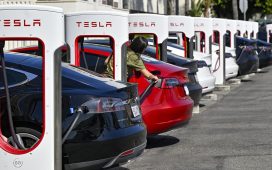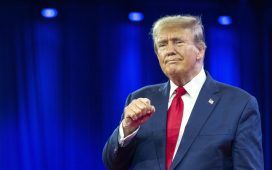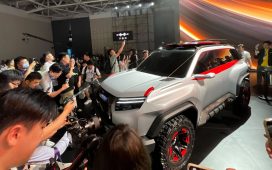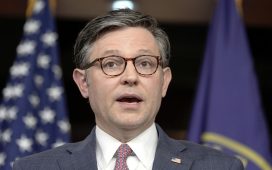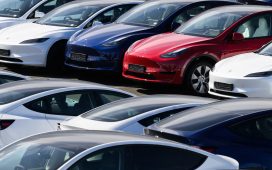Trump also targeted Japan’s Toyota Motor Corp. for building more cars in Mexico. Shortly thereafter, the automaker said it would invest $10 billion in the U.S. and months later it unveiled plans for a new factory built jointly with Mazda Motor Corp. in Alabama.
By the same token, General Motors’ 2018 decision to close its Lordstown, Ohio, assembly plant as part of layoffs affecting 14,000 workers in North America was a devastating blow, both for the rustbelt community of 3,200 and Trump’s jobs record.
In June, Vice President Mike Pence visited the Lordstown plant, now occupied by an electric-truck startup that employs a tiny fraction of the workers GM did. He touted the completion of the U.S.-Mexico-Canada Agreement, or USMCA, as a game-changing law that will stop auto jobs from leaving the country.
“The incentive that was in NAFTA to move jobs south of the border — that’s all gone,” he said. “We’re going to keep automotive jobs growing right here in Ohio and right here across the United States.”
‘No. 1 accomplishment’
The agreement, which raised regional content requirements and labor standards for cars to trade duty-free, is “the No. 1 accomplishment for this administration for this industry,” said Ann Wilson, senior vice president of government affairs at the Motor and Equipment Manufacturers Association, which represents auto suppliers.
But while industry leaders laud the stability USMCA created, they’re cautious on whether it will create more auto jobs in the U.S.
“The next couple years will tell whether these provisions helped meet that objective,” Wilson said.
Whatever the Trump administration’s manufacturing achievements, they came at the expense of a costly trade war that forced companies to operate amid chaos and uncertainty. Ford and GM lost at least a billion each absorbing steel and aluminum tariffs.
Off-road vehicle manufacturer Polaris Inc., which relies on cheap Chinese parts to keep its assembly plants running in the U.S., says Trump’s policies were a wash financially, though deregulation was “incredibly helpful.”
“The lower tax rate saved us about $70 million,” said CEO Scott Wine. “Almost all of that tax benefit was offset by tariffs.” Polaris is lobbying Congress for an exemption of the tariff on Chinese goods.
Passing on costs
Harold Weaver, president of a metal stamping company in Gadsden, Ala., says the trade war with China actually brought him new business, albeit indirectly.
Weaver, whose company, Stamped Products Inc., supplies metal parts for Hyundai Motor Co., Kia Motors Corp., Honda Motor Co. and Daimler AG’s Mercedes vehicles, says foreign automakers preemptively moved parts work to the U.S. out of concern their home countries could face similar tariffs.
“When he came in and started putting those tariffs on, we started doing work that we’d never had the opportunity to look at because they were imported.”
Weaver didn’t mind the steel tariffs because he was able to pass on the cost to his automaker customers.
A reset of trade relations with China is the Trump administration’s other big achievement, even if tangible results are still elusive, industry observers say. U.S. trade deals needed to be reworked, because they’re stuck in a post-World War II era when Europe was rebuilding its economy and China wasn’t the biggest car market in the world, said Xavier Mosquet, senior partner at the Boston Consulting Group in Detroit.
“Whether it’s a Biden administration or a Trump administration, I think it should be part of the U.S. policy,” Mosquet said. “Once we pay the cost of entry it would be good to go to the end, and not waste this effort that has been taken.”
